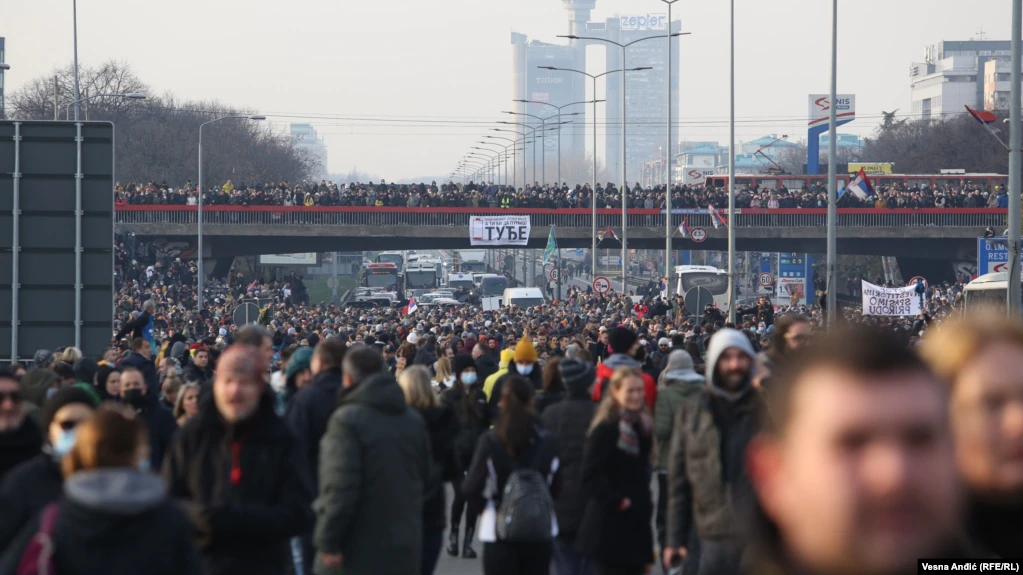BELGRADE/NOVI SAD — Thousands of demonstrators have protested around the country with blockades in Belgrade and other cities to oppose new legislation on property expropriation and referendums that they contend favor private companies over citizens and the environment.
Main streets and a highway in the capital were blocked by protesters.
Minor incidents and some skirmishes were reported as demonstrations took place in Novi Sad, Zrenjanin, Sabac, Nis, Kragujevac, Subotica, Uzice, and Raska.
The protests come as long-standing public opposition mobilizes against plans for a huge Anglo-Australian lithium mine in western Serbia and with reports trickling out of alleged neglect for environmental and labor safeguards at a handful of major Chinese-run facilities in the country.
Serbia suffers from some of Europe’s worst pollution, and critics lay much of the blame on government corruption and lax regulatory enforcement to encourage the flow of foreign investment into the Western Balkans’ biggest economy.
For the second Saturday in a row, activists took to the streets over the authorities’ recent moves to lower the referendum threshold and allow for swift expropriation of private property if deemed in the public interest.
A fight broke out in Novi Sad between protesters and a small number of young men who threw stones at those gathered to block a main boulevard.
There was no police presence at that event, in an echo of similar standoffs last week where groups of counterprotesters were allowed to manhandle demonstrators.
Ahead of the rallies, the Interior Ministry warned that the blockades were illegal.
President Aleksandar Vucic had said there would be no action against the protesters by lay enforcement “as long as they do not endanger the lives and property of people and institutions.”
Speaking during a trip to western Serbia on December 4, Vucic said he had not yet signed the amendment to the law on expropriation, which was passed by his Progressive Party (SNS) allies in parliament a week ago.
The deadline for his signature is December 10.
Vucic said he disagreed with the changes to the expropriation law as passed and pledged to seek changes, but he did not specify what those changes would be.
The approved bill allows for private property to be taken, with compensation, within five days if it is deemed to be in the national interest.
Vucic said that is insufficient time for owners to challenge such a finding.
Vucic already signed new legislation eliminating the threshold for minimum participation in national referendums.
He has previously pledged to hold a referendum on Anglo-Australian mining and mineral giant Rio Tinto’s $2.4 billion plans for a 250-hectare underground mining complex near Loznica.
On November 27, thousands of protesters blocked traffic at roads and bridges in Belgrade and other cities and towns.
Several demonstrators were detained.
Environmental groups and civil society organizations argue recently adopted amendments to the Law on Expropriation and the Law on Referendum will pave the way for foreign companies to circumvent popular discontent over projects such Rio Tinto’s.
Serbian authorities have rejected the accusations, saying the new laws are needed because of infrastructure projects.
Rio Tinto has said it plans to present an environmental impact study by the end of this year, and next year begin the four-year construction of the mine to exploit a massive deposit of jadarite, a mineral high in lithium and borates that was discovered in 2004.
Experts have warned the project could destroy farmland and further pollute the waters of a country already racked by severe levels of air, land, and water pollution.
Rio Tinto has vowed to respect all Serbian laws and denied its project will endanger the environment.
Vucic said during a visit to the planned mine site in Gornje Nedeljice, near Loznica, that he wanted to hear all of the citizenry’s concerns and promised he will ask Rio Tinto to protect public health.
“What is important is that we talk and try to solve problems,” Vucic said.






